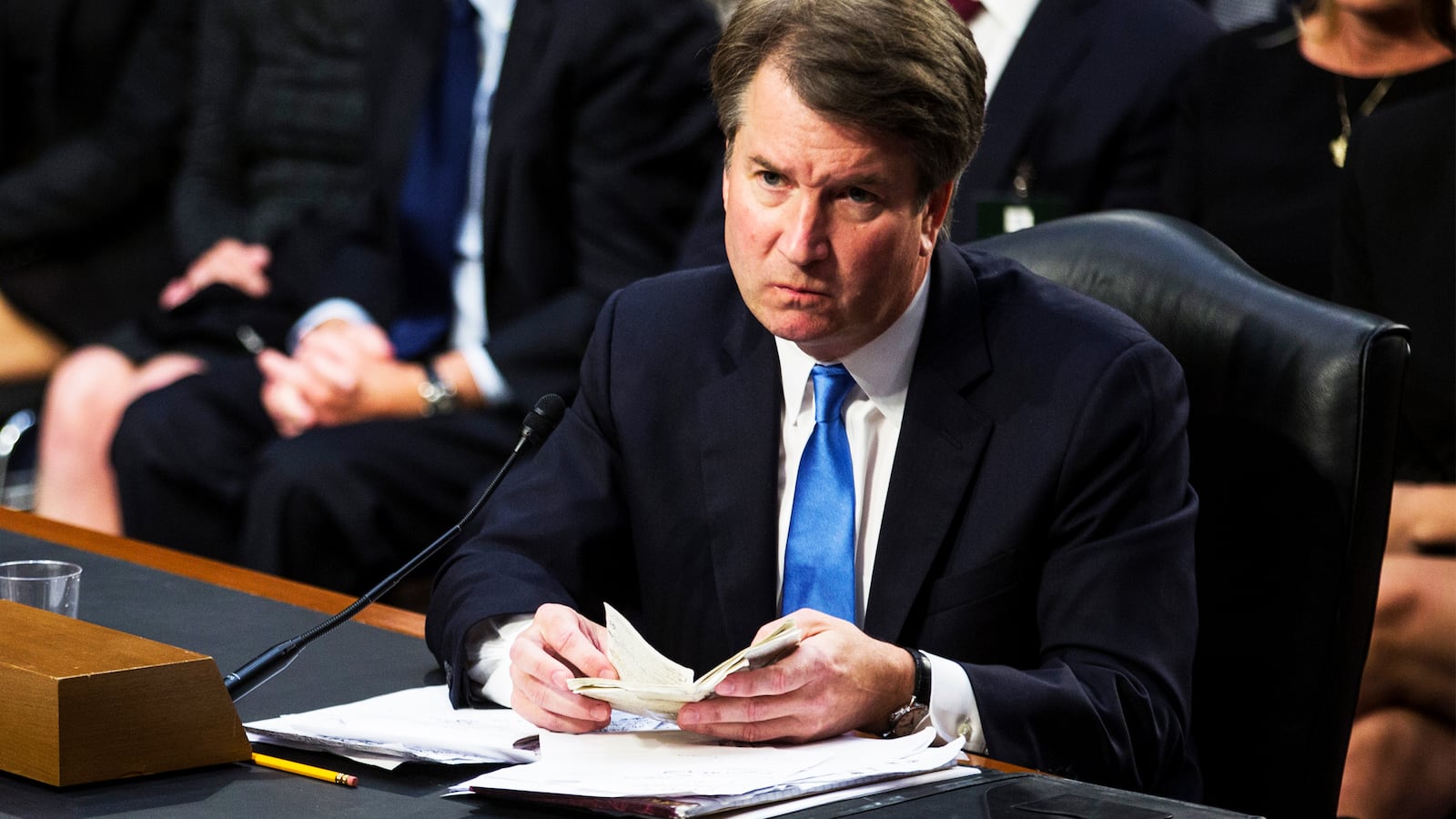In a surprise move, Sen. Patrick Leahy (D-VT) challenged Judge Brett Kavanaugh, President Trump’s nominee to the Supreme Court, over “Memogate,” an obscure 2003 scandal that could engulf Kavanaugh’s nomination, during Wednesday’s marathon confirmation hearing.
The scandal, largely forgotten today, involved two Republican congressional staffers stealing confidential memoranda from Senate Judiciary Committee computers and turning them over to GOP interest groups. It remains unknown whether the White House—where Kavanaugh was deputy White House counsel—also received the memos. In his 2006 confirmation hearing, and again this week, Kavanaugh swore that he did not.
But on Wednesday, Leahy suggested that the Senate Judiciary Committee has in its possession six emails that directly contradict Kavanaugh’s sworn testimony—which would mean he twice committed perjury.
If true, that would surely imperil the Kavanaugh nomination, which has been coasting through the Senate Judiciary Committee despite fierce (and impotent) Democratic opposition. It’s one thing for Democrats to complain about improper vetting procedures—quite another if the nominee is caught blatantly lying under oath.
Committee Chair Sen. Chuck Grassley (R-IA) has promised to release the censored emails Thursday.
Memogate, as it was called at the time, involved the judicial confirmation process of Judge Priscilla Owen in 2003. Democrats objected that her views were outside the judicial mainstream, and successfully stalled the nomination until it was pushed through two years later as part of a bipartisan compromise.
As the White House official responsible for judicial nominations, Kavanaugh was at the center of that battle, as he affirmed in his testimony.
On Nov. 14, 2003, The Wall Street Journal published documents it described as Democratic “staff strategy memos.” An investigation by the senate sergeant at arms, published on March 4, 2004, revealed that a clerk for the committee, Jason Lundell, had accessed Democratic files from the committee’s server and provided them to Manuel Miranda, who had been a fellow clerk on the committee from 2001-03, but in 2003 was an aide to Senate Majority Leader Bill Frist.
Files of aides to Sens. Ted Kennedy, Richard Durbin, Dianne Feinstein, Joe Biden, Russ Feingold, and, perhaps most important, Leahy himself, had been leaked first to Miranda and then to conservative advocacy groups and the press.
(Miranda at first protested his innocence, then resigned and confessed, but said, among other things, “My parents never taught me not to read other people’s mail. They always read my mail.” The Bush administration chose not to prosecute him, and he went on to a career as a Republican activist, most notably in the opposition to the nomination of Justice Sonia Sotomayor.)
In a series of leading questions, Sen. Leahy attempted to trap Judge Kavanaugh into explicitly denying that he ever saw the memos—a trap Kavanaugh, whose job used to include prepping judicial nominees for adversarial hearings, deftly avoided.
First, Leahy implied that the committee also possessed evidence of an off-site meeting (“maybe at a bar or restaurant”) between Kavanaugh and Miranda, asking Kavanaugh if he recalled ever having such a meeting.
“I can’t deny that,” Kavanaugh replied.
Next, Leahy pressed and asked if there were such a meeting, did Miranda “ever hand you material separately from what would be emailed back and forth?”
“I don’t know the answer to that, Senator,” said Kavanaugh.
Finally, Kavanaugh asked Leahy what specific evidence he was referring to, and Leahy replied, “we’d have to ask the chairman what he has in the confidential material.” A visibly angry Sen. Grassley replied that 80 percent of the material had been released to the public.
Finally, Leahy laid his cards out on the table. “I am concerned,” he said, “because there is evidence that Mr. Miranda provided you with materials that were stolen from me. And that would contradict your prior testimony. It is also clear from public emails—and I’m refraining from going into non-public ones—that you had reason to believe materials were obtained inappropriately at the time.”
Then, turning to Sen. Grassley, he said, “Mr. Chairman, there are at least six documents that you consider committee confidential that are directly related to this, [in addition to] three documents that are already public. These other six contain no personal information. No presidential-act-restricted material. There is simply no reason they won’t be made public.”
The game of chess, between a 40-year veteran of the Senate and an intelligent nominee whose job used to be coaching judicial nominees, was riveting to watch. But is there any substance behind it?
We’ll have to wait for the release of the documents. Perhaps Sen. Leahy is bluffing—or perhaps the once-certain Kavanaugh nomination is now in jeopardy.
If Kavanaugh is shown to have received the memos, he will have to fall back on his claim that there was nothing untoward about them and they escaped his notice (and memory). “It would have not have been unusual,” Kavanaugh said, for aides to say “the Leahy people are looking into this and the Hatch people are looking into that.’”
But one of the seven aides whose memos were hacked, who spoke to The Daily Beast on the condition of anonymity, said that claim was absurd. “Any Republican would know that they’re not supposed to be seeing internal Democratic staff memos,” the aide said.
At the very least, the mere fact that the documents have been withheld lends credence to one of the Democrats’ primary objections to the Kavanaugh nomination: that with more than 100,000 pages of his records being concealed by the White House, and many more released to the committee but not to the public, it is impossible to conduct a thorough evaluation of Judge Kavanaugh’s candidacy.
Thus far, the Judiciary Committee has only received about 7 percent of the documents from Kavanaugh’s time in the Bush administration (457,000 documents), and Sen. Grassley has marked 189,000 of them as confidential.
Republicans were the ones chanting “But Her Emails” only two years ago, but Democrats have now learned the tune.






